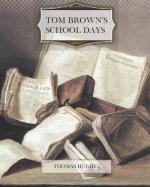Cheery and unmindful of himself, as Benjy was, this loss of locomotive power bothered him greatly. He had got a new object in his old age, and was just beginning to think himself useful again in the world. He feared much, too, lest Master Tom should fall back again into the hands of Charity and the women. So he tried everything he could think of to get set up. He even went an expedition to the dwelling of one of those queer mortals, who—say what we will, and reason how we will—do cure simple people of diseases of one kind or another without the aid of physic, and so get to themselves the reputation of using charms, and inspire for themselves and their dwellings great respect, not to say fear, amongst a simple folk such as the dwellers in the Vale of White Horse. Where this power, or whatever else it may be, descends upon the shoulders of a man whose ways are not straight, he becomes a nuisance to the neighbourhood—a receiver of stolen goods, giver of love-potions, and deceiver of silly women—the avowed enemy of law and order, of justices of the peace, head-boroughs, and gamekeepers,—such a man, in fact, as was recently caught tripping, and deservedly dealt with by the Leeds justices, for seducing a girl who had come to him to get back a faithless lover, and has been convicted of bigamy since then. Sometimes, however, they are of quite a different stamp—men who pretend to nothing, and are with difficulty persuaded to exercise their occult arts in the simplest cases.
Of this latter sort was old Farmer Ives, as he was called, the “wise man” to whom Benjy resorted (taking Tom with him as usual), in the early spring of the year next after the feast described in the last chapter. Why he was called “farmer” I cannot say, unless it be that he was the owner of a cow, a pig or two, and some poultry, which he maintained on about an acre of land inclosed from the middle of a wild common, on which probably his father had squatted before lords of manors looked as keenly after their rights as they do now. Here he had lived no one knew how long, a solitary man. It was often rumoured that he was to be turned out and his cottage pulled down, but somehow it never came to pass; and his pigs and cow went grazing on the common, and his geese hissed at the passing children and at the heels of the horse of my lord’s steward, who often rode by with a covetous eye on the inclosure still unmolested. His dwelling was some miles from our village; so Benjy, who was half ashamed of his errand, and wholly unable to walk there, had to exercise much ingenuity to get the means of transporting himself and Tom thither without exciting suspicion. However, one fine May morning he managed to borrow the old blind pony of our friend the publican, and Tom persuaded Madam Brown to give him a holiday to spend with old Benjy, and to lend them the Squire’s light cart, stored with bread and cold meat and a bottle of ale. And so the two in high glee started behind old Dobbin,




